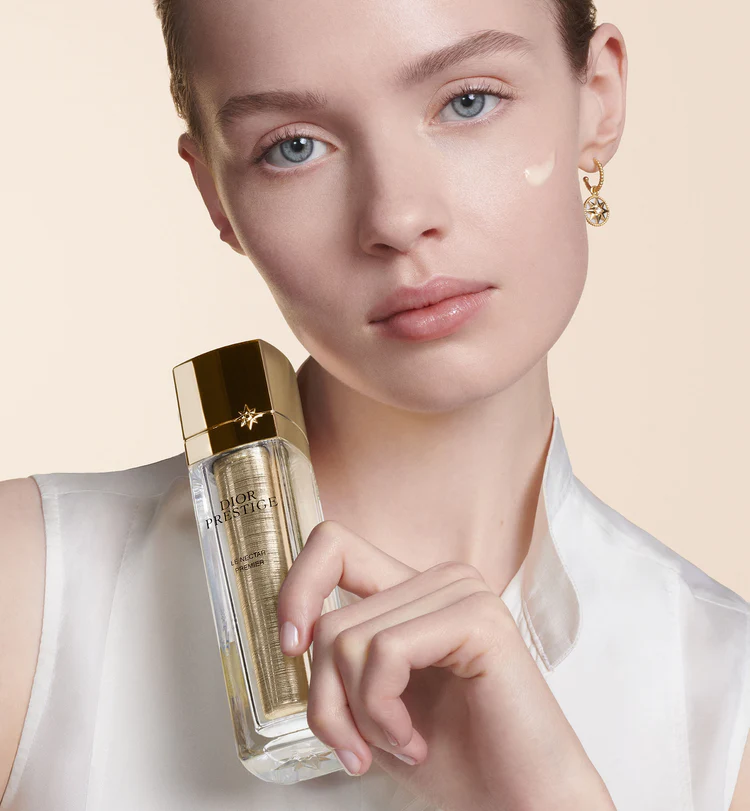Luxury cosmetic brands are all racing to invest in product improvements promising skin rejuvenation. But do they really deliver?

Summary: Desire to “preserve youth” Beauty in medicine A holistic view on aging
The desire to prevent or slow down the effects of aging persists – and this directly drives sales for companies. But what lies behind the story of creating products against these signs of aging? Is “anti-aging” real or just a marketing ploy exploiting everyone’s fear of aging?
Desire to “preserve youth” From the recent buzz around Pamela Anderson’s bare face at age 56 at Paris Fashion Week, to the unedited photo of Isabella Rossellini at 71 on the cover of Vogue Italia’s October issue, the question of how women should prevent aging remains a controversial topic. In the beauty industry, this is evidenced by the enthusiastic support for products containing the term “anti-aging” – something scientists consider a promise that cannot be fulfilled.
This is seen as a threat to cosmetic brands. The desire to prevent or slow down the effects of aging persists – and drives sales. Skincare brands like Tula, Olay, and Dove have coined terms like “ageless” and “anti-aging”, aiming to make consumers feel more positive.
Sarah Lamb, an anthropologist and professor of aging research at Brandeis University in Massachusetts, shared that the ideal of eternal youth is hard to achieve because we often lack determination. “This means that to successfully combat aging, you have to control yourself. We have a responsibility to maintain good health so as not to become a burden to society,” she said. “Younger people tend to see aging as a fear they must control.”
Brands have seized on this psychology to persuade consumers that the “right” way to prevent aging is to use the products they sell. With claims and studies, effective ingredients and scientifically-backed formulas, they can set higher prices for anti-aging products. The high-end Swiss skincare brand La Prairie’s Platinum Rare Haute Rejuvenation Mask, promising “optimal overnight anti-aging skincare”, was launched this month with a price tag of $1,779. Dior’s first 30ml anti-aging serum, Le Nectar Premier, launched in September, priced at $860. The revamped anti-aging cream and lotion line from luxury cosmetics company Sisley Paris also comes with a luxurious price tag of $940 per bottle.
Some beauty brands interviewed by Vogue Business stated that their products are not designed to help “slow down” the natural aging process, but instead play a role in preventing skin damage or supporting cell regeneration. However, this still stimulates consumers, making them feel they need to buy products they believe will help them maintain their youth – and with it, maintain their value in society.
The fear of aging has become too evident, Lamb of Brandeis University said. “We call it an ‘anti-aging industry’. People have become too familiar with the notion that aging is ‘bad’.”
Pamela Anderson caused a sensation with her bare face at Paris Fashion Week. Anderson, Rossellini, and other celebrities like 78-year-old actress Helen Mirren, who have appeared in campaigns for L’Oréal, seem like positive examples in a world that loves youthfulness. However, historian, cultural critic, and author Larry Samuels cautioned us: “These are celebrities and PR methods. Marketers are very clever in choosing these faces, but these are actually rare cases. The media promotes them loudly, but in reality, they still have to deal with aging.”
Consumer obsession with preserving youth has not diminished, but only rejuvenated, Samuels said. This week, Dior launched a new skincare and fragrance line for children, priced at up to $230 for a bottle of perfume. There are also new brands like Florence by Mills and Bubble Skincare set to launch on the market with claims to help consumers combat aging from an early age.
Samuels showed us a controversial TikTok filter that went viral in March for using artificial intelligence to show users what they would look like when they age. Kylie Jenner, founder of Kylie Cosmetics, experienced it and appeared uncomfortable: “I don’t like this face at all!”
Isabella Rossellini on the cover of Vogue Italia’s October 2023 issue (unretouched). Only a few young users reacted positively to this filter, Samuels said. “Most of the comments mention aging and death. The fear of becoming irrelevant and disappearing someday.” Although many scientists have convinced people to accept their age, many consumers will “do whatever it takes to look as young as possible”, and brands have no reason to change this mindset, Samuels believes. “Anti-aging is a potential goldmine market and generates huge revenue.”
However, today’s consumers also expect brands to have a smarter approach to anti-aging and beauty. About 86% of US consumers want to see realistic faces of aging in skincare product advertisements, while 61% feel that this industry has a negative view of aging, according to 2022 data from Mintel. 69% also agree that society’s view of beauty is still too rigid.
Meanwhile, consumers, celebrities, and influencers increasingly oppose the perfectionist ideology in marketing. Last September, 33-year-old actress Julia Fox shared a TikTok video advising people to accept their true age. “If I see any product labeled anti-aging, I’ll sue because I’ll still age no matter what product I use.”
Beauty in medicine Research on longevity and aging is increasingly prioritized by luxury companies like Dior, as the brand claims to be a pioneer in transitioning to the field of “reverse aging” applied to the skin.
Specifically, in April, Dior announced the launch of the first ‘International Council on Reverse Aging’, consisting of 600 researchers and 18 experts, including Dr. Nicola Neretti, a biologist at the Institute for Brain and Neural Systems at Brown University; and Dr. David Furman, director of the Immune Aging Project at Stanford University. In June, the council met for the first time in Paris and met with Dior researchers to discuss this topic.
When health equates to luxury, Dior sees an opportunity to invest in scientific research to identify the signs of aging and develop solutions that can “make us live longer and healthier,” said Virginie Couturaud, Director of Scientific Communication. “Aging is a process that leads to disease, so the goal is to reduce age-related diseases, and reduce the time we live with illness to extend healthy years.”
Dior focuses on stem cell regeneration, eliminating oxidized proteins, and dealing with minor inflammations, Couturaud shared. Dior’s initial efforts in reverse aging began in 2022 when “it was discovered that the respiration and energy of stem cells gradually decrease with age, explaining the delayed cell regeneration and increased signs of aging,” she added.
Dior’s Prestige Le Nectar Premier and Capture Totale serums both treat mild skin inflammation and regenerate epidermal cells from deep within. Many reverse aging skincare products will be introduced in the coming years. “We not only address surface symptoms, but also delve into the causes of aging,” she said.
Skin regeneration is an important research area for La Prairie, with patented Macro-Infusion technology that the brand claims will introduce large biological molecules into the skin to provide immediate benefits. So far, large biological molecules, such as hyaluronic acid and collagen, cannot penetrate the skin’s surface without the help of cosmetic procedures, according to the brand. “Macro-infusion technology,” combined with active ingredients, makes the brand’s highest-end product line, Platinum Rare, the most powerful.
It’s not about marketing, emphasized Jacqueline Hill, La Prairie’s Director of Science and Product Development. “Our products can improve how everything works in the skin, which is why you’ll see real results. We want to provide stimulation to rejuvenate cells and maximize their function, thereby improving skin structure.”
Time is a challenge for products to be effective. “You don’t see how it works directly on the skin, but you can see the result of improved and firmer skin structure,” Hill affirmed. “But if you expect results equivalent to surgery, perhaps your expectations are too high.”
A holistic view on aging
Consumers should think of aging as part of life, Hill shared. “Instead of using terms like anti-aging, we talk about regeneration and what we can do to help prevent that process. You shouldn’t spend 40 years of your life lying in the sun and smoking every day, not exercising and consuming sugar all day, and then think you can fix everything by using skincare products.”


Related post
5 Tips to Style Hoodies on Cold Winter Days
As winter settles in, many of us find ourselves reaching for cozy essentials that provide warmth and comfort. One such wardrobe staple is the hoodie.
The Truth Behind the Rumor ‘Santa Claus Is Ugly’ That Surprises Many
As the holiday season approaches, the character of Santa Claus emerges in various forms, his iconic red suit and white beard eliciting warmth and joy
Guide to Creating a Heavy Metal Sound in the Style of Tony Iommi
Heavy metal is a genre rich with history and technical prowess, and few guitarists have influenced its sound as profoundly as Tony Iommi, the legendary
Breaking Down the Key Tactical Edgeas in the Oakland Raiders Lineup
Breaking Down the Key Tactical Edges in the Oakland Raiders’ Lineup reveals not just a football team but a storied franchise with an indomitable spirit.
The Most Heartwarming Moments of Spider Man On Screen
The world of Spider-Man is not just filled with thrilling battles and breathtaking stunts; it’s a tapestry woven with moments of profound empathy, love, and